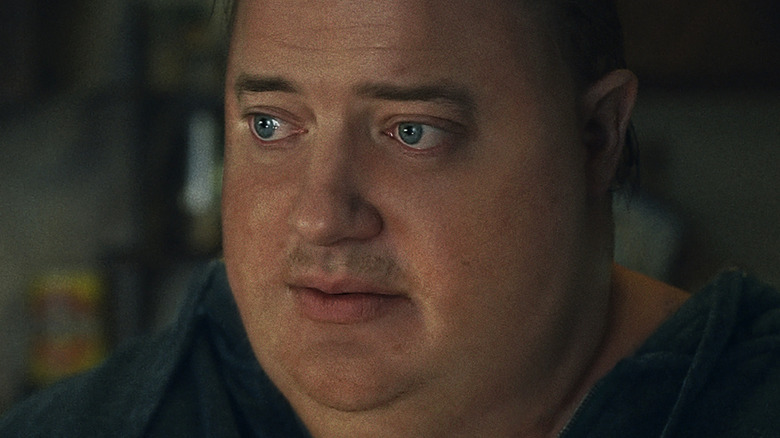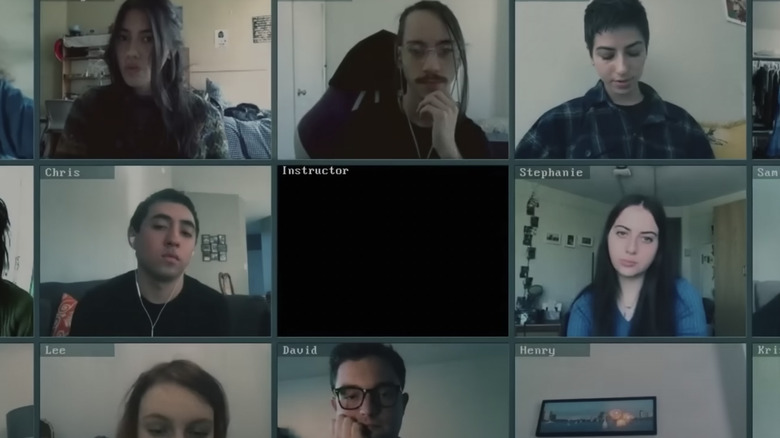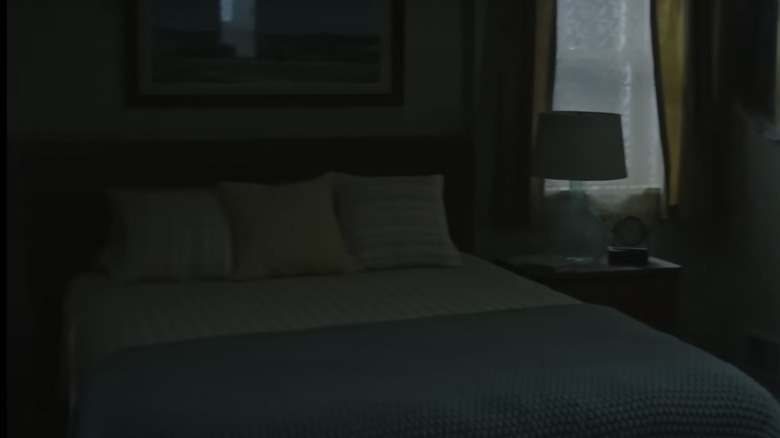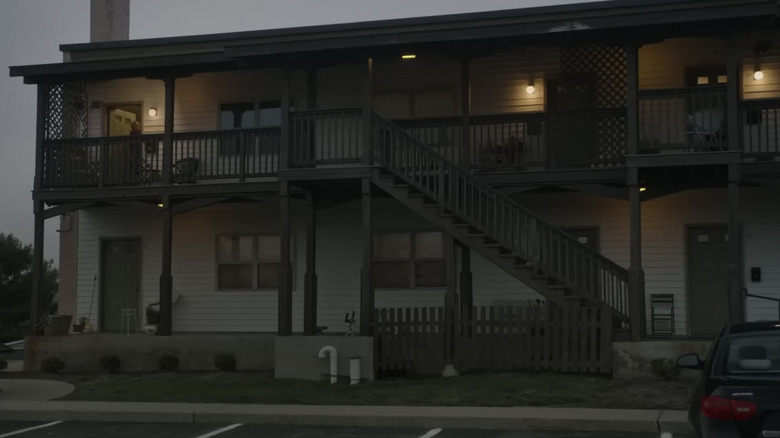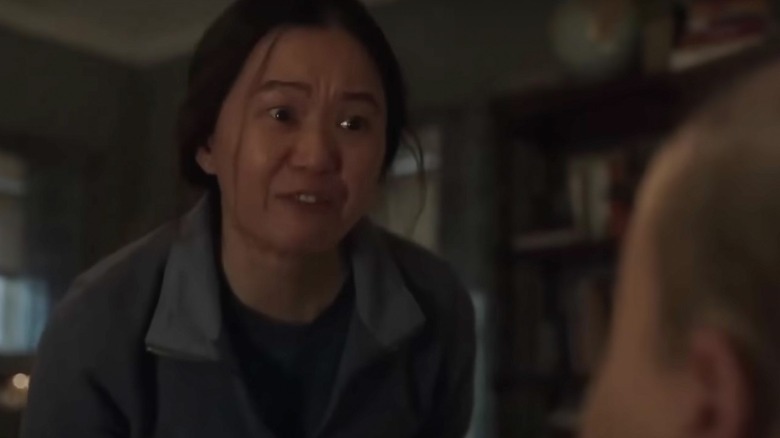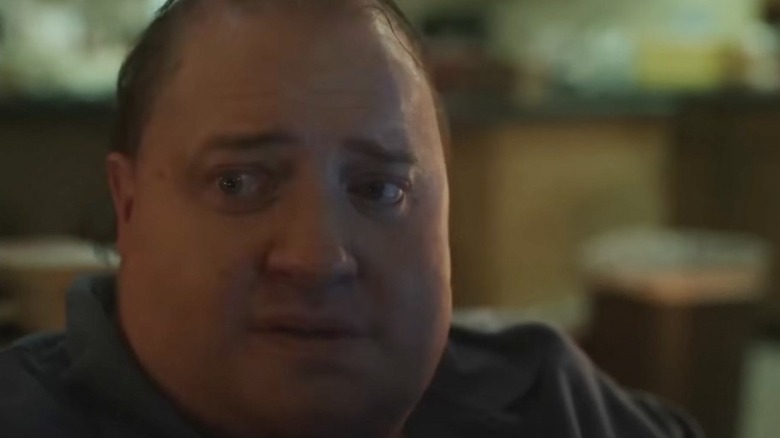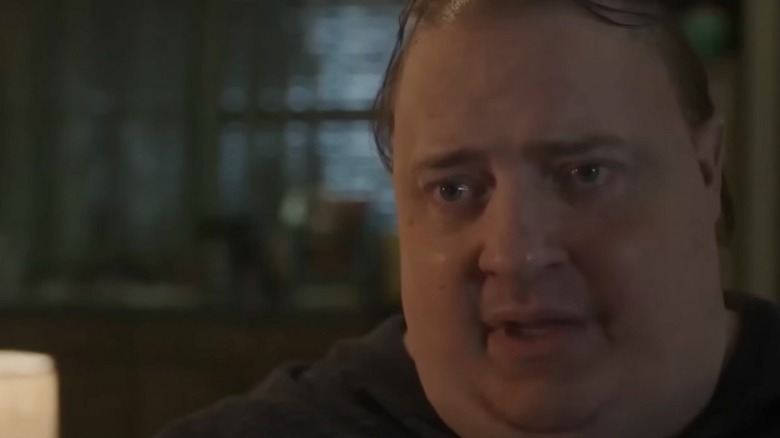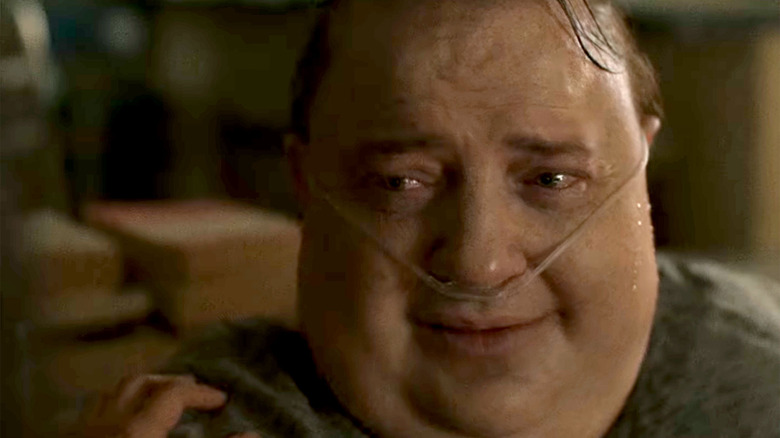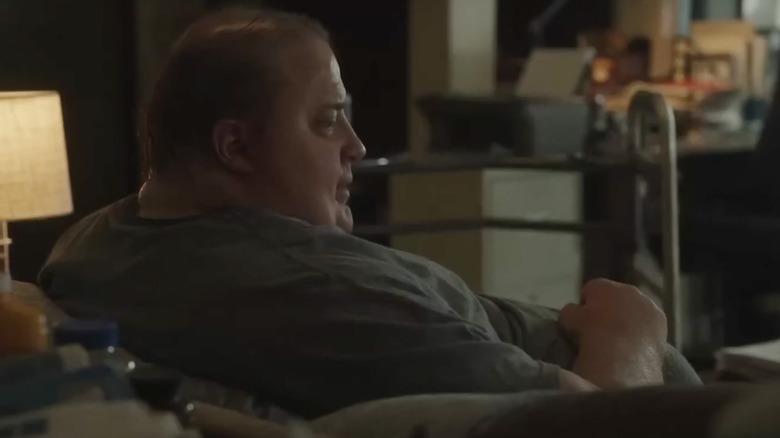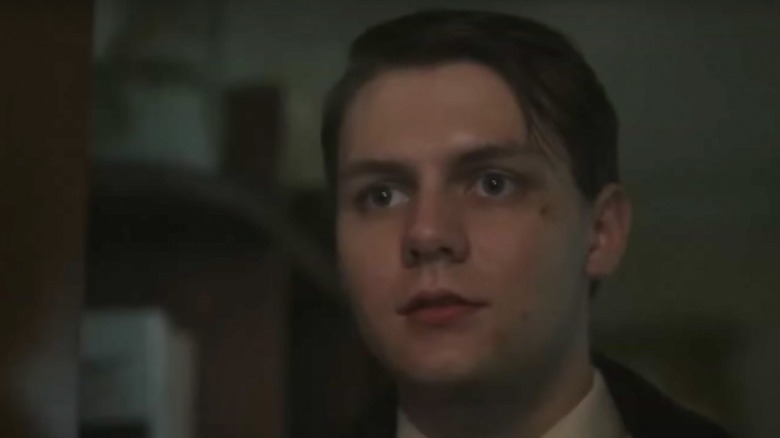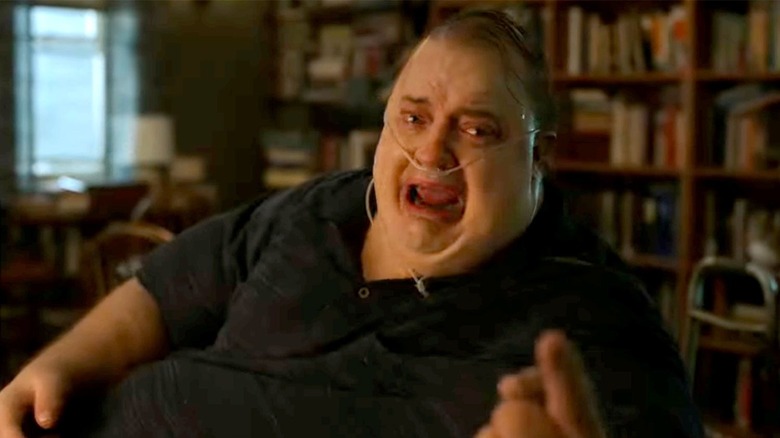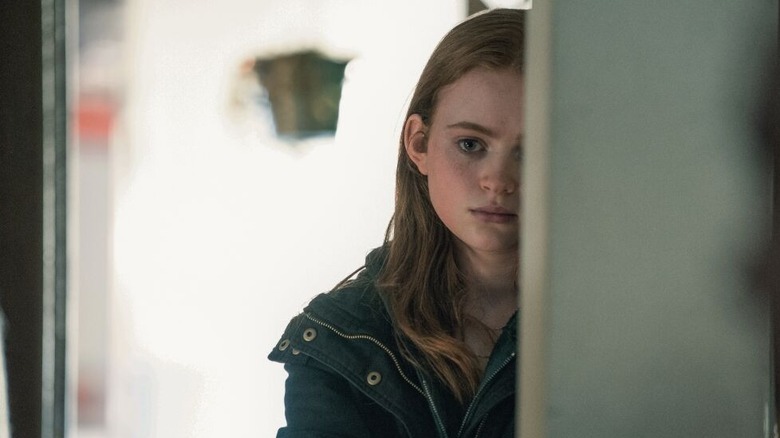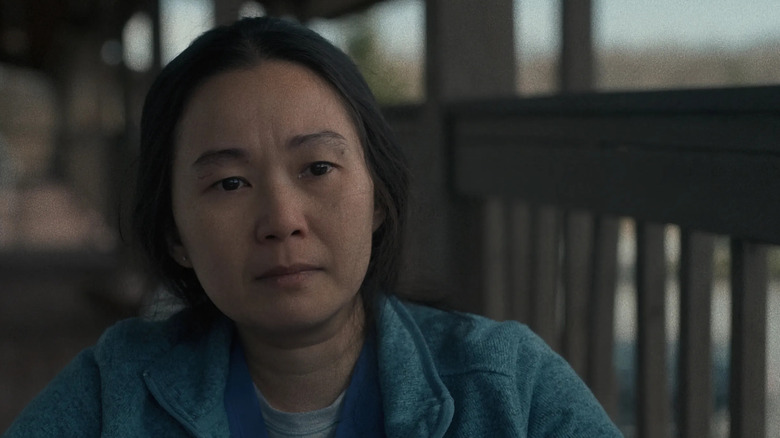The Whale's 12 Most Heart-Wrenching Moments Ranked
Director Darren Aronofsky is known for making dramas — like "Requiem for a Dream," "The Wrestler," "Black Swan," and more — that walk the line between philosophical and torturous as if it's a high wire. His latest, "The Whale," is no different. Based on a play of the same name by Samuel D. Hunter (who also penned the screenplay), the movie adaptation tells the story of Charlie, a reclusive 600 lb. man who is estranged from his ex-wife and daughter and who's mourning the death of his life partner by binge eating to the point of disability. Whether "The Whale" humanizes or stigmatizes its main character is very much in the eye of the beholder and probably depends upon lived experience. And for some viewers, it may vary from scene to scene. The movie has proved to be divisive with critics and audiences, though Brendan Fraser's central performance has received acclaim across the board and does much of the work to tip the scales toward empathy rather than stigma.
But "The Whale" isn't only interested in obesity. It's just as unflinching (and some might say exploitative) in its depiction of alcoholism and drug use, homosexuality, religiosity, and working-class poverty. Like most Aronofsky projects, it's not any one specific affliction or marginalized group that the director is exploring but agony itself. "The Whale" is hit-and-miss in its ability to mine Charlie's despair for something worthwhile to say about the human experience. Whether they worked for audiences or not, these are the 12 most heart-wrenching moments.
12. Charlie struggles to connect to his students
"The Whale" opens with a brief prologue in which Charlie is teaching a college composition course remotely. Viewers could be forgiven for assuming the film takes place during the COVID-19 pandemic, when many classes were relegated to the online space. But "The Whale" actually takes place during the 2016 election cycle, so the fact that Charlie is teaching online tells us quite a bit about his and his students' situations. Most obviously, we don't get to see Charlie before we hear him because he has his webcam turned off. He lies to his students and says his laptop's camera is still broken, which suggests he's never shown his face to his virtual classes as long as he's been teaching online. Most people who bought a ticket for "The Whale" probably knew about the premise going in, so we can guess why he's hesitant to be seen.
His pupils do have their cameras turned on, however, and Charlie can see how distracted and checked out most of them are. The tragedy of "The Whale" extends far beyond Charlie's life story; it's about isolation and regret as they apply to everyone, and Charlie's students not only mock him (which doesn't seem to bother him), they're disinterested in the content and in trying their best (which definitely does bother him). We get the sense from Charlie's teaching that this is not him at his intellectual best. There's a hint of a long-lost passion for writing and educating in his voice as he goes through the lesson plan, but this drab, formulaic version of Charlie as a professional feels like a shadow of who he once was.
11. His old bedroom is off-limits
About halfway through "The Whale," after his daughter Ellie brings up his deceased partner Alan Charlie works up the courage to unlock their old bedroom. But he drops the key and can't reach it (which is a harrowing moment in and of itself), and has to wait for Thomas to return (if he returns) to get it out from under a tight spot. When he finally cracks open the door, we see that Charlie kept everything exactly as it was the moment Alan died, as if their shared space is a time capsule or a museum. The bed is neatly made with a piece of art (of the sea, no less) hanging centered over the headboard. The books are neatly arranged on the shelves. This cozy cared-for space is in stark contrast to the mess Charlie lives in now. His bedroom has trash in the corners, his bed is never made, and the rest of the apartment is falling into disrepair. It's all a gut-punching metaphor for how put-together someone can be during the good times and how disordered life can become during the bad times.
To continue the metaphor, Charlie tries to turn on the light, but nothing happens. The bulb has burnt out. Even worse, he attempts to wheel himself into the room, to remember his life with Alan one last time before what's sure to be his imminent death. But his wheelchair doesn't fit through the door frame. Sadly, Charlie literally can't get back to what his life with Alan was like.
10. The pizza guy sneaks a peak
Throughout "The Whale," Charlie orders pizza from the same local restaurant. The delivery guy knows the routine. Leave two pies on the bench; there's $20 in the mailbox. As Charlie gets audibly sicker, the pizza guy yells in to see if he's okay. Charlie insists that he is, and the pizza guy leaves. But he's there so often, eventually, he decides to introduce himself as Dan. Dan tries to strike up a conversation with Charlie, seemingly to lure him out of his apartment, but again, Charlie insists he's fine and waits for Dan's shadow to disappear past his blinded-up window.
However, on one rainy night toward the end of the movie, Dan's curiosity compels him to wait for Charlie to come out and fetch his pizzas. He lingers on the landing of the stairs, and when Charlie emerges, he's taken aback by the sight of his body and oxygen tubes. Clearly, the film is making it seem like Dan's judging someone like this for ordering pizza so often. The incident is particularly painful to Charlie, who doesn't leave his home or try to become close to people precisely because he fears that this will be the reaction. For example, he repeatedly asks Thomas if he's disgusting and he wonders to Ellie who would want someone like him in their lives. Dan the pizza guy's revulsion confirms Charlie's worst nightmare.
9. Liz doesn't know about Charlie's savings account
The first time Ellie comes over, Charlie offers her money — about $120,000 — to spend time with him in his dying week. Turns out, he'd been saving most of his salary for the last nine years as a nest egg for his daughter, which his ex-wife decided she could have access to after her 18th birthday. That's coming up, and Mary is worried that she's not mature or decent enough to handle the influx of cash that's coming either by the end of the week or by the end of her senior year. This compels her to visit Charlie's apartment for the first time in years, where she, Ellie, Liz, and Charlie get into a fight.
The saddest thing about this moment is that Liz didn't know about the savings account. All this time, she thought he was getting by paycheck to paycheck, with no more than roughly $700 in his checking account. Not only could he have prolonged his own life by purchasing health insurance, but he's also put her in a tougher-than-necessary position for their entire friendship. Charlie could've afforded the things — a hospital bed, medical equipment, etc. — that she had to scrounge for. She's also hurt that he let her walk through the snow when her truck was broken when he had the funds to help her fix it. Charlie reminds her that he offered, but she responds that she didn't take his money when she mistakenly thought he didn't really have any. This breach of trust between Charlie and who has become his closest companion shows that, while he's well-intended (especially when it comes to his daughter), his empathy has blind spots.
8. Charlie nearly chokes to death
Charlie and Liz have an extremely complex relationship. She's the younger sister of his late partner Alan, and she loves Charlie because she knows that Charlie loved Alan when her religious fundamentalist parents could not. They drove him to die by suicide while Charlie gave him the best years of his life. She's also, unofficially, his nurse, since he refuses to go to the hospital. That puts Liz in an impossible position. She's constantly torn between trying to intervene and letting him self-destruct. And she's angry that he's put her in the position of having to be the person who brings him the food and drink that will hasten his heart attack and the person who will probably be there to witness it.
This is most apparent when she comes over to check on him with, say, a bucket of fried chicken or a meatball sub. In the case of the latter, a few bites in, he begins to gasp for air. Liz is over at the sink, chatting away, none the wiser. When she realizes he's choking, she springs into action, pushes him to the arm of the couch with great effort, and manages to dislodge the piece of the sandwich and save Charlie's life. We can see the terror on Charlie's face as he's unable to vocalize his need for help and comes to terms with the fact that this might be the end. But from Liz's perspective, she's incensed that he can't even safely chew his food so as not to cause a catastrophe. Moments later, however, she feels guilty about her outburst.
If you or anyone you know is having suicidal thoughts, please call the National Suicide Prevention Lifeline by dialing 988 or by calling 1-800-273-TALK (8255).
7. He searches his symptoms
Anybody who's ever taken to the internet to try to diagnose a health problem will sympathize with what Charlie does the first time he's alone in his apartment after Liz tells him he has congestive heart failure. He's sitting on a stool in his kitchen, unable to keep his mind on grading papers when he opens up a new browser window and types (with a spacing error) congestive heart failure into the search bar. Charlie scrolls through the results. The camera zooms in on words like "obese" and "BMI," and Charlie doesn't like what he sees.
Next, he searches for the shockingly high blood pressure reading that Liz took the night before. Again, the results are deeply upsetting. A summary at the top of the page explains that he has hypertension stage three, which requires immediate medical attention. Charlie's research confirms that he is truly in an emergency situation. The search results all instruct him to call an ambulance. Even though Charlie has probably subconsciously decided to die without intervention, it's still devastating to watch him try to process the truth of his prognosis as he sees it in black and white on the computer screen.
6. A hopeless Charlie binges
"The Whale" contains several mentions and illustrations of disordered eating. Through his conversation with Mary, we learn that Charlie has always been a little heavy, but that he liked food and liked to cook. Food may have been an indulgence in those times, but not quite a drug. Not only does Charlie develop an unhealthy relationship with food after Alan's death, Liz talks about Alan's reluctance to eat prior to his death by suicide.
The film's most wrenching depiction of disordered eating, though, comes After Dan the pizza guy expresses disgust at Charlie. Feeling immense shame, he goes back into his apartment and binges on the first pizza. Then he opens his fridge and consumes its entire contents along with the second pizza and anything else he can find in his cupboards. Both the quantity of food that he consumes and the combination of the particular foods he chooses are apt to make the audience feel sick (this isn't a judgment of Charlie as a person or his willpower, but of the aesthetic quality of the filmmaking in the scene). This montage of excess is difficult to watch in the same way that alcohol or drug benders are in similarly dark movies. The aftermath is just as painful, too. Charlie vomits most of it back up into a trash can and struggles to regain his breath.
If you or anyone you know is having suicidal thoughts, please call the National Suicide Prevention Lifeline by dialing 988 or by calling 1-800-273-TALK (8255).
If you or someone you know needs help with mental health, please contact the Crisis Text Line by texting HOME to 741741, call the National Alliance on Mental Illness helpline at 1-800-950-NAMI (6264), or visit the National Institute of Mental Health website.
5. Thomas catches Charlie in a compromising position
After Charlie's online class, the film cuts to its most divisive scene in which we see Charlie for the first time. In Darren Aronofsky's typical style, it's squeamishly off-putting on purpose. Charlie is shot from behind, masturbating to pornography on his laptop. He's unkempt and sweaty and very nearly gives himself a heart attack. When he reaches for his phone, presumably to call Liz, he fumbles over it. This is the moment that self-directed New Life missionary, Thomas, walks into.
If audiences are being generous, they could reason that Aronofsky introduces us to Charlie in such a vulnerable way because we're supposed to have empathy for this person. After all, these behaviors are normal, and people typically engage in them in private moments, as Charlie's doing. The only variable is Charlie's size and precarious medical condition. It's possible the director is challenging our notions of what's gross and undignified and how they apply to different types of people.
But that a homophobic religious zealot is the person who walks in on Charlie complicates that interpretation a bit. It certainly embarrasses Charlie and it puts the audience in the position of catching him, too, which — were that to happen to anyone — would rob someone of their dignity at the moment. As morally and emotionally fraught as this scene is, it does serve as the inciting incident that propels the rest of the movie forward when, as a result, Liz learns Charlie's heart is failing.
4. Charlie defends his and Alan's love
Thomas decides to go home thanks to Ellie's damning photos of him smoking pot and the audio confession. Though Charlie believes she did this on purpose, to encourage his parents to reconcile with their son, it's left up to the viewer to decide whether her intentions were pure. Before he leaves for Waterloo, he tries one last time to help Charlie find God, and this time, Thomas thinks he's found a secret weapon.
He recites bible verses to Charlie from Alan's own bible, sections he highlighted that have to do with living in the flesh versus living in the spirit. The missionary tells the dying man that he's figured out why Alan was so unhappy: He couldn't get over the fact that he'd chosen to live in sin with Charlie. Thomas is openly blaming Charlie for Alan's death by suicide, in contrast to how Liz blamed the church for his depression and death earlier. This is a crushing accusation to our protagonist. He already feels guilty for abandoning Ellie and Mary to be with Alan, and he already feels like, in his current state, no one could possibly love him. All he has is his happy memories with Alan and the conviction that their love was worth the sacrifices they both made.
Charlie pushes back against Thomas' conclusion. He tells him that Alan thought he was beautiful and that when they were together, physically, they made love. His argument doesn't convince Thomas, who at long last admits he finds Charlie disgusting, but it gives Charlie the chance to revisit his life with Alan before his own ends.
If you or anyone you know is having suicidal thoughts, please call the National Suicide Prevention Lifeline by dialing 988 or by calling 1-800-273-TALK (8255).
3. He needs to know Ellie will be okay
Liz tells Mary that Ellie has secretly been visiting Charlie, which leads to an explosive scene that fills us in on this family's past. After an angry Liz storms out and Mary forces Ellie to leave, the exes have a heart-to-heart about everything that's gone wrong. Mary thinks Charlie always knew he was gay and married her because he wanted kids. She's incredibly wounded at having been left for a man, something she struggled to explain in public. But most of all, she worried that Charlie would think she was a bad mother after she fought for sole custody, and Ellie became a troubled teen. Eventually, she explains, she kept her away because she was mortified at the kind of person Ellie had become and worried she would hurt Charlie.
For his part, Charlie has come to realize that he didn't push hard enough to be part of both of their lives. Sure, she denied him visitation and kept him at a distance, but it was probably convenient for him to be kept at a distance, too. At least at first, he seemed content to call every once in a while and receive a copy of an eighth-grade English paper as proof that they were both hanging in there. Their shouting match at least resolves a few things. Charlie doesn't blame Mary for Ellie's problems, and he doesn't think Ellie's a lost cause. And Mary learns that Charlie probably won't survive the week, which explains his urgency with his daughter. When Charlie cries out that he just needs to know he did one thing right in his life, she understands that he means leaving his daughter in a good place.
2. Ellie reads her essay one last time
"The Whale" gets its title from the fact that English teacher Charlie is obsessed with the empathy and honesty demonstrated by his daughter Ellie in her eighth-grade essay about Herman Melville's "Moby Dick." To him, it's proof that she's a smart and good person (Charlie's twin ideals), and hearing it read out loud is one of the few things that brings him peace. He has a confused Thomas read it as he thinks he's dying early on, and he revisits it throughout to try to convince Ellie that she's "amazing."
When Charlie is certain that his heart is giving out, he asks her to read it one last time. At first, she refuses in the bratty manner she usually uses to speak to her father. Then, she realizes what's happening and picks up the pages. Earlier, she'd cruelly dared Charlie to walk to her without his walker. He fell and hurt himself before he could even get to his feet. This time, with tremendous difficulty, he stands up and walks a few steps toward her. She runs over to embrace him, underscoring the essay's thematic resonance: Even though her father's life is sad, and her life has been sad so far, she loves him and cares for him and knows that he was always trying to keep her from the tragic parts of life as best he could. Ellie's final reading of her essay and her hug implies that she's forgiven him and accepted her own life could be better, and Charlie dies remembering the good times and knowing he's succeeding in helping his daughter to heal.
1. Charlie and Liz say goodbye
As tearjerking as the final few minutes of "The Whale" are, it's the scene that occurs just before that really tugs at the heart and soul. Liz comes back to make amends with Charlie before he passes. At first, she expresses frustration that Charlie didn't have to see Alan's body, to which he heartbreakingly replies he wasn't allowed to since he wasn't "family." Then, she lets him know she's furious he's putting her through the same thing her brother put her through. They both self-destructed in front of her. Finally, with tears streaming down her eyes, she thanks Charlie for loving her brother. Charlie feels as though he failed. He says that he thought if he just loved Alan enough he could save him. "I don't think I believe anybody can save anybody," Liz says. Though Liz's epiphany sounds defeatist, this is her way of empathizing with Alan and Charlie, and forgiving them for the hardships they put on her shoulders. It's also her way of telling Charlie that isn't responsible for Ellie's past, present, or future behavior.
Charlie whispers that he thinks people can't help but care about other people, even if they aren't always perfect at doing it in practice. "People are amazing," he says. He's referring to Alan, who died by suicide, to Ellie, who's lashed out as a defense mechanism, and to Liz, who has become the most important relationship in his life. They embrace one last time and she says she'll wait downstairs, presumably for the ambulance (or the coroner) to come.
If you or anyone you know is having suicidal thoughts, please call the National Suicide Prevention Lifeline by dialing 988 or by calling 1-800-273-TALK (8255).
